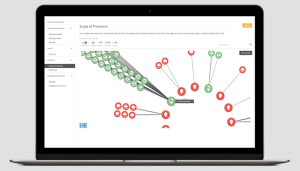
People, rather than technology, are always the biggest impediment to progress, according to many of the experts gathered in London for the recent Digital Transformation Expo Europe event. Cybersecurity was another hot topic at the expo and one that continues to see the industry grappling with balancing the needs of an increasingly digital economy against protecting sensitive data from the constant threat represented by malicious third parties.This year, “Keeping Competitive: Creating a Digital Culture Using Technology Translators” was the umbrella theme for the event and its accompanying seminar programme. To their credit, the organisers turned out an all-star panel for their flagship discussion session – Finbarr Joy, Senior Adviser to international gambling company Superbet; Aubrey Stearn, Chief Technical Officer of leading British building society Nationwide; and Mark Ridley, a former Chief Information Officer of Reed, one of the United Kingdom's largest recruitment consultancies. Chairman duties fell to Stuart Sumner, Editorial Director of specialist IT news portal Computing.
Addressing just why some companies' bids to digitally transform themselves ultimately proved disastrous, there was broad consensus that it is nearly always down to problems with corporate culture and key personnel rather than technical failures. Another issue that engaged the panel was the optimum length of the incubation stage of the transformation process. With each of the speakers having experience of an unnecessarily lengthy incubation period, which had ultimately derailed the implementation phase of the transformation process, it was broadly agreed that prompt action was essential to maintaining momentum when initiating such a comprehensive, company-wide upgrade.
At the end of the session, the panel left delegates with two take-home principles. Firstly, it is always better to change what people actually do, rather than to try to change how they think; and secondly, that it's usually far cheaper to simply stop doing something than to develop a means of automating it. The panel also advocated one further, seemingly heretical, notion – it is imperative that common sense should be applied throughout any large-scale digital transformation.Away from the seminar and on to the expo hall proper, it appeared that one issue in particular was pre-occupying stallholders and itinerant attendees alike – cybersecurity. Indeed, even for those with other priorities, it was all but impossible not to be drawn in by Texas-headquartered Alert Logic, with its team's ubiquitous orange shirts all rather ominously declaring: "We binge watch your systems."At the company's stand, Account Manager Dru Vangdama was happy to expand upon the proposition, saying: "One of the major differences between Alert Logic and other platforms is that our large team of experts is out there 24/7 threat-hunting and identifying where threats are likely to occur."

Related link
HKTDC Research


